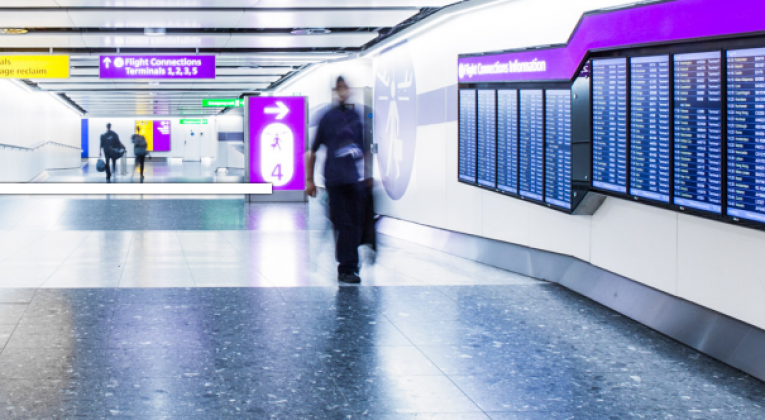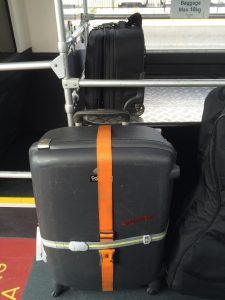Some links to products and partners on this website will earn an affiliate commission.
Unless you’ve managed to completely avoid any news over the last couple of days, you’ve probably already heard something about new cabin baggage restrictions on electronic devices. Both the US and the UK have announced an electronic device cabin ban (on some routes) for items larger than a mobile phone being taken onto flights on your person or in your hand luggage (ie. you will need to place items like laptops, tablets etc into your checked luggage).
In this article, I’m focusing purely on the UK ban – the details of the US ban are different.
Here’s what we know so far:
UK Electronic Device Cabin Ban
Which routes are affected?
All direct passenger flights to the UK from the following countries:
- Turkey
- Lebanon
- Jordan
- Egypt
- Tunisia
- Saudi Arabia
Note that flights from the UK to the listed countries are still fine – it’s only the flight back home to the UK that is impacted.
What devices are banned?
The ban applies to any electronic device larger than 16cm long, 9.3cm wide or 1.5cm deep. This certainly includes e-readers, tablets, laptops, and possibly items like cameras too. If you have a very large smartphone, get your measuring tape out, as that could be affected as well.
What does the electronic device cabin ban mean and how will it affect me?
The ban means that you have to put any relevant items into a bag that you check in and which is then placed in the hold of the plane, rather than in the cabin with you.
This is problematic for (at least!) three main reasons:
- If you weren’t intending to check in a bag (I almost always just travel with hand luggage), you’re now going to have to. This is obviously inconvenient as you will need to wait for your luggage, and may even prove costly too, as on many airlines these days you need to pay extra to check in a bag.
- Many travellers prefer to keep delicate and expensive items like laptops with them in the cabin, because baggage handlers aren’t always as gentle (or as honest) as might be hoped.
- Some companies and other organisations insist that employees keep laptops or other items containing potentially sensitive data with them in the cabin when flying.
This has the potential to get quite messy for both passengers and airlines.
There is bound to be a lot of passenger confusion as the ban comes into force – and potentially even anger too, if airlines demand payment for checked baggage from passengers who would much rather just have hand luggage.
Turkish Airlines, in particular, is going to be severely impacted as it uses Istanbul as a hub from the world to the UK.
What to do
Given the likely scale of the potential disruption, I think it’s reasonable to assume that the Government hasn’t taken the decision to introduce the ban lightly. Even if that assessment is wrong, there’s no choice but to make the best of the situation.
In practical terms, that means being proactive if you are going to be flying on an affected route. For example:
- Don’t take expensive electronics with you, unless you really need to. Many people have accumulated old phones, tablets and laptops that are still perfectly usable but that they will care a lot less about breaking than their latest MacBook Air.
- Carefully consider how best to protect your electronics from even the roughest baggage handlers – cotton wool and bubble wrap might not be the first items you previously had on your holiday packing list, but maybe they are now.
- Get in touch with your airline to see what their advice is, and see if they will waive the checked baggage fee if they normally charge one.
Bottom line
The electronic device cabin ban is an evolving story with quite a few details currently still a little unclear. If you think you might be travelling on an affected route, keep an eye on the latest news. We’ll be doing our best to keep you updated too of course, but obviously lack the resources of the BBC or Sky News when it comes to breaking developments!
I wouldn’t be surprised to see other countries adopting similar policies soon, so keep an eye out for that too.
Is anyone booked on an affected route? – What are you planning to do?





Fingers crossed that this pointless ban doesn’t extend across Europe before my upcoming Turkish flight…
You cannot take liquids in bottles over 100 ml but you can take a lot of smaller bottles and an empty big bottle.
You cannot take a knife but in first they will serve you a meal with a metal one.
You cannot take ipad from Turkey but you can if you fly via Moscow. You can also if you fly from Dubai unless you fly to US.
You can take an old bulky mobile but not a slim modern ipad.
If it is not crazy I dont know what is.
Totally agree. The “switch off all electronic devices when taking off/landing” is another ludicrous one. If there was even the remotest chance they could create an issue for the plane’s navigation, then surely you wouldn’t be allowed them on there in the first place.
Call me a cynic but that liquids ban is only still in place because the airports, and now airlines, make so much money from selling you food and drink air-side / on-board.
I think take off/landing is the invention of a BS excuse so that people aren’t watching something on their tablets and potentially less aware of their surroundings. Everybody knows that a certain percentage of mobile phones are left on by mistake on every single flight with absolutely no impact on navigation…
As for electronics, just have passengers prove that they actually work by making them turn them on. I doubt somebody could fill a laptop with explosives whilst keeping it operational…